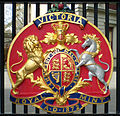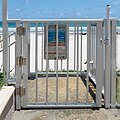Gate
This article needs additional citations for verification. (September 2018) |



A gate or gateway is a point of entry to or from a space enclosed by walls. The word derived from old Norse "gat"[1] meaning road or path; But other terms include yett and port. The concept originally referred to the gap or hole in the wall or fence, rather than a barrier which closed it. Gates may prevent or control the entry or exit of individuals, or they may be merely decorative. The moving part or parts of a gateway may be considered "doors", as they are fixed at one side whilst opening and closing like one.[2]
A gate may have a latch that can be raised and lowered to both open a gate or prevent it from swinging.[3] Gate operation can be either automated or manual. Locks are also used on gates to increase security.
Larger gates can be used for a whole building, such as a castle or fortified town. Doors can also be considered gates when they are used to block entry as prevalent within a gatehouse.
Purpose-specific types of gate

- Baby gate: a safety gate to protect babies and toddlers
- Badger gate: gate to allow badgers to pass through rabbit-proof fencing
- City gate of a walled city
- Hampshire gate (a.k.a. New Zealand gate, wire gate, etc.)
- Kissing gate on a footpath
- Lychgate with a roof
- Mon Japanese: gate. The religious torii compares to the Chinese pailou (paifang), Indian torana, Indonesian Paduraksa and Korean hongsalmun. Mon are widespread, in Japanese gardens.
- Portcullis of a castle
- Race gate used for checkpoints on race tracks.
- Slip gate on footpaths
- Turnstile
- Watergate of a castle by navigable water
- Slalom skiing gates
- Wicket gate
Image gallery
-
This gate and massive gateposts has no locks—a gate marks a borderline in ownership/use and can allow passage.
-
A small, elegant gate to a meadow path
-
Ishtar Gate is the oldest city gate in existence
-
Wringin Lawang, a 14th-century Majapahit split gate, called "Candi bentar", in Trowulan, Java, Indonesia
-
This gate at Columbia University was closed to prevent entry of protesters
-
A gate at Kansai University, built in 1923
-
Malaysian King's Palace Gate, Kuala Lampur
-
Medieval ironclad city gate, from the Upper Gate in the old town of Ohrid
-
Chinese traditional type gate (iron gate in front of house) in Kerala, India
-
Gates decorate routes in the entrance of Muscat, Oman
-
Kuwait Gate, historically surrounded Kuwait City, built in 1929
-
Royal Military College of Canada front gates and gatehouse
-
Ernst Rudolph, By the Entrance
-
A wooden gate pictured in the coat of arms of Nivala
-
Decorative emblems of state are also fixed on gates to public buildings, old Royal Melbourne Mint
-
Gate of Shri Swaminarayan Mandir, Bhavnagar, India
-
Dr.Babasaheb Ambedkar Marathwada University gate on the eve of Namvistar Din celebrations reflects Ajanata art
-
Michael's Gate in Bratislava, Slovakia
-
St. Louis Gateway Arch
-
Warsaw University main gate, Poland
-
Gate of Farm Gunsteling in Namibia (2017)
-
A Japanese temple gate (mon) at Eiheiji
-
The Iron Gates of Osgoode Hall, Toronto
-
Beachside gate with a self-latching device and a higher than 54” release mechanism.
See also
- City Gate
- Barricade
- Boom barrier (a.k.a. boom gate)
- Border
- Gate tower
- Gopuram
- Leave the gate as you found it
- Portal (architecture)
- Portcullis
- Threshold (disambiguation)
- Triumphal arch
- List of scandals with "-gate" suffix
- Watergate, as used in politics
References
- ^ "gate | Origin and meaning of gate by Online Etymology Dictionary". www.etymonline.com. Retrieved 2019-04-20.
- ^ "GATE | meaning in the Cambridge English Dictionary". dictionary.cambridge.org. Retrieved 2019-04-20.
- ^ "Hardware 101: Gate Latches". Gardenista. 2016-11-17. Retrieved 2019-04-20.

































